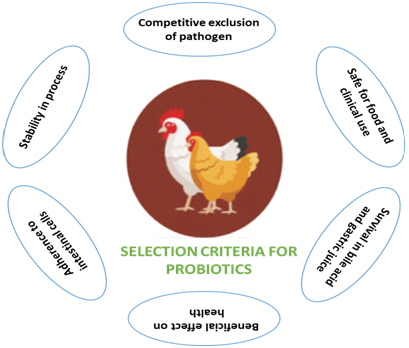

Elie Metchnikoff, who worked at the Pasteur Institute in Paris, was the pioneering researcher in the fields of fermentation and probiotics. He claimed that Bulgarian peasants who consumed a lot of soured milk lived longer than average. This strengthened Metchnikoff's belief that microbes from the soured milk would affect the lower gut and overall health. Following this realization, he tested cultures of milk that were fermented by the Lactobacillus genus. Lactobacillus bulgaricus later became the strain popular for fermenting yoghurt.
Although the idea of adding so-called helpful bacteria to the digestive tract is not new, we still don't fully understand where, when, and how to employ them. The discovery that administering a suspension of gut contents from healthy adult chickens might shield newly hatched chickens from Salmonella enteritidis colonisation was a glaringly significant milestone in the use of probiotics in poultry feeding. This concept is called competitive exclusion.Nutritionists and veterinary professionals have recently focused a lot of emphasis on poultry growth promotion through correct nutrient utilisation and supplementation of probiotics in their diet.
It is believed by most investigators that there is an unsteady balance of beneficial and non-beneficial bacteria in the tract of normal, healthy, non-stressed poultry. When a balance exists, the bird performs to its maximum efficiency, but if stress is imposed, the beneficial flora, especially lactobacilli, have a tendency to decrease in numbers and an overgrowth of the non-beneficial ones seems to occur. This condition may cause diarrhoea, or it may persist sub clinically, lower production metrics like growth rate, and feed efficiency. Probiotics provide an environment in the intestines that encourages the colonisation of good bacteria while reducing the amount of pathogen colonisation.
The perceived desirable traits for selection of functional probiotics are many. A microorganism must meet four key requirements in order to be considered a probiotic strain: (i) it must be sufficiently characterised; (ii) it must be safe for the intended use; (iii) it must have at least one positive clinical trial that has been carried out in accordance with generally accepted scientific practises; and (iv) it must be alive in sufficient numbers and at an effective dose throughout the product's shelf life. In addition, probiotic strains' ability to tolerate acid and bile acids is among their most crucial qualities. Since pH 3.0 is a frequent benchmark used to assess the acid tolerance of a probiotic culture, it is advised that a good probiotic must be able to survive this condition.

In order to exert its antimicrobial activity against potentially harmful bacteria or fungi, it must be a typical resident of the gut and be able to stick to the intestinal epithelium. It must also have the capacity to lessen pathogen adherence to mucosa. Probiotic strain pre-selection has been facilitated by the development of numerous in vitro assays. For the purpose of tracking the survival of the most promising strains found through in vitro experiments in chickens, the competitiveness of these strains is assessed in vivo. Potential probiotics must also have positive impacts on the host, such as improved nutrition and a stronger immune system. The probiotic must also be technologically feasible for industrial procedures and able to survive under typical storage settings (e.g., lyophilization).
Scientists are currently making efforts to understand the delicate symbiotic relationship of poultry with their bacteria, especially in the digestive tract where they are very important to the well-being of poultry. Probiotic production constitutes an important aspect of applied biotechnological research. Probiotics have a huge potential to replace antibiotics and serve as nutritional supplements in poultry feeds for promoting growth, regulating intestinal microflora and pathogen inhibition, immunomodulation, and improving meat quality in poultry.
© Agrivet Research & Advisory . All Rights Reserved | Design & Developed by DITS